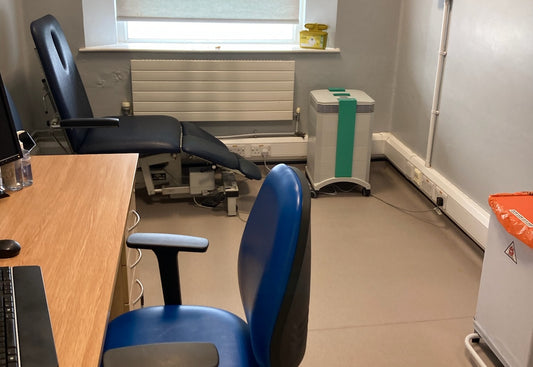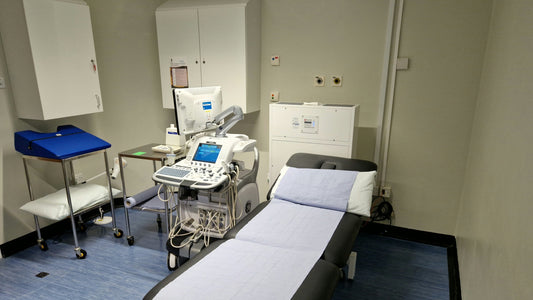A recent leak of ammonia from a fridge caused the evacuation of 27 patients from a ward at Sunderland Royal Hospital. The incident was promptly and efficiently dealt with by specialist firefighters but is a reminder of how good gas and chemical hazard control is essential.
This type of event highlights the fact that hospital heating and ventilation systems are mostly unable to cope with specific and localised contamination, and often require local specialised assistance.
The IQAir air filtration units are designed for this specific application and can be configured to control each specific gas or chemical hazards found in hospitals.
The United States Occupational Safety & Health Administration (OHSA) has compiled a virtual reality tool which reveals all the locations within the hospital where gas and chemical hazards may be found, as described below:
Hospital Wide
- Glutaraldehyde. Known as Cidex, Aldesen, Hospex and a number of other brand names, glutaraldehye is used as a cold sterilant for medical, surgical and dental equipment that is heat sensitive, as a hardening agent in the development of X rays and as a tissue fixative in pathology and histology. Thus, those healthcare staff working in the operating theatre, endoscopy and dialysis units and intensive care may be exposed, along with technicians working in labs. Short-term exposure to glutaraldehyde liquid or vapour give rise to eye irritation and skin burning. When breathed in, glutaraldehyde gives rise to breathing difficulties, tightness in the chest, irritation of eyes, nose and respiratory tract. In the longer-term, glutaraldehyde exposure causes eczema, skin allergy and is also suspected of causing occupational asthma.
The IQAir GCX MultiGas is specifically engineered to capture and retain a broad range of gaseous pollutants including aldehydes.
- Mercury. Thermometers and blood pressure measuring machines may contain mercury, and a spill can cause exposure to mercury vapour, which can be absorbed through the skin and has a number of health effects on the gastrointestinal and nervous systems and the kidneys.
The IQAir Dental Pro has been specifically developed to control mercury vapours in addition to VOCs and disinfectant odours.
The Laboratory
- Formaldehyde. Most labs and the morgue will use formaldehyde as a fixative. Acute exposure causes eye and respiratory irritation. Chronic exposure may lead to bronchitis, bronchial pneumonia, laryngitis, and conjunctivitis. On top of this, formaldehyde is a suspect carcinogen.
The IQAir GCX MultiGas is ideal for formaldehyde and other gas and chemical hazard control.
- Toluene, xylene, and acrylamide. Toluene and xylene are used as a solvent in the fixing of tissue specimens and also to rinse tissue stains. Acrylamide is used in the gel analysis of DNA. Toluene and xylene cause similar symptoms to formaldehyde exposure. Acrylamide causes eye and skin irritation on acute exposure and is a suspect carcinogen for chronic exposure.
The IQAir GCX VOC air filtration unit is the perfect solution for the control of xylene and other volatile organic compounds.
The Operating Theatre
- Waste anaesthetic gases. Nitrous oxide and a number of halogenated gases (enflurane, isoflurane, sevoflurane, desflurane and halothane) may leak out during surgical procedures where there are poor working practices, leaking gas lines, patient outgassing during recovery or inadequately maintained equipment. There are many short term and long term health hazards associated with exposure to these gases, from nausea and dizziness to liver and kidney disease and cancer.
The IQAir GCX MultiGas air filtration unit is the ideal solution for the control of waste anesthetic gases and broad spectrum gas and chemical hazard control.
- Compressed gases. Either gas cylinders or fixed pipes may contain compressed gases, such as oxygen, and their escape, during poor handling, may cause a fire, explosion and toxic effects (the exact nature of the hazard being dependent upon the identity of the compressed gas involved).
The IQAir GCX MultiGas is the best solution for the capture of a wide range of gaseous hazards.
- Smoke. Laser surgery may generate a smoke plume when tissue is destroyed. This may contain toxic gases such as hydrogen cyanide, benzene and formaldehyde, which may cause eye and upper respiratory tract irritation, while formaldehyde and benzene are both listed carcinogens.
The IQAir GCX MultiGas is the best solution for capture of a wide range of gaseous hazards, particularly when fitted with the FlexVac accessory for localised capture of fumes.
- Hazardous chemicals. The operating theatre may be a source of exposure to peracetic acid, used in sterilising machine and methylmethacrylate which is a kind of cement used in orthopedic surgery.
The IQAir GCX Acid Pro air filtration unit is particularly suited to the control of these airborne contaminants.
Housekeeping
Housekeeping is an important part of the infrastructure of the hospital. Staff who are involved in its various operations use many products and chemicals which may be hazardous. For instance, cleaning materials containing bleach can cause burns, if spilled, and may also generate toxic gases if mixed with other products. Detergents may cause allergic reactions. Where allergic dermatitis causes breaks in the skin, cleaning staff may become exposed to infection.
Laundry
Like housekeeping, laundry is an essential hospital service. The chemical hazards are similar (bleach, detergents and so on) to those found in housekeeping tasks.
Pharmacy
The hospital pharmacy contains thousands of drugs, many of which are potentially hazardous to those who handle them. Exposure through the skin or by inhalation may occur during preparation, administration, storage or disposal.
For this particulate contamination, the medical grade IQAir Cleanroom H13 is ideal.
Contact us today for expert advice: 0203 176 0524
Further information: https://www.ohsa.gov/SLTC/etools/hospital/




